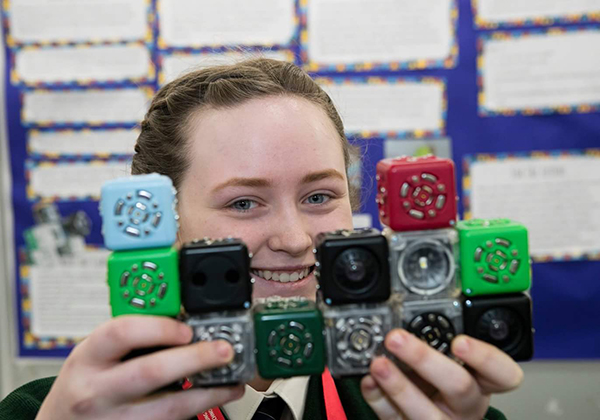We love hearing about all the ways that Cubelets are being used to build better thinkers. Whether it’s a tweet showing off robots built by a first-grade class, seeing Blockly in action during Coding Club, or cheering on the robot races in a makerspaces, we treasure it all. But every once in awhile, we come across a story so inspiring that we just have to share it with everyone. This is Hayley’s Cubelets story.

Like most sixteen-year-olds, Hayley Brady’s interests cover the map. An avid painter, she is also involved in various activities at her school, most notably as the vice president of the “nerd club.”
“[It’s] basically a place for people who are interested in science, movies, comic books, TV shows, and video games to come and discuss and occasionally debate about their interests.”
The Dublin, Ireland native has the same big dreams as most 16-year-olds, too, wanting to study veterinary medicine. She already volunteers with a local animal rescue group, helping trap and neuter feral cats, or fostering animals in need.
But Hayley isn’t just focused on her future: she has already made a huge contribution to her local school, and qualified for the BT Young Scientist and Technology Exhibition Final in January of 2018.
How? Hayley recognized the potential of Cubelets robot blocks as a tactile and interactive way to reach students with Autistic Spectrum Disorder. Her project, “The Development of An Interactive and Tactile Learning Programme for Children With Autism Spectrum Disorder Using Modular Robotics.” was deemed “inspiring” by the BTYSTE judges, and was seen by over 50,000 people at the exhibition.
“We purchased the Cubelets for use in the Special Ed department using funding our government provided for “hand held” technology,” says Hayley’s teacher, Lynda Jordan, of Pobalscoil Iosolde in Dublin. “The lessons involved initially [were] inquiry based learning. The students were asked to identify the functions of the Cubelets and allowed to experiment with the possibilities.”
Hayley, however, saw untapped potential in the little blocks.
“There had been no research made that I could find on how Cubelets could be used in special needs classes. I immediately jumped on the chance to use the Cubelets to make a class specifically for students with Autism Spectrum Disorder, as it is important to me, and I have a first person perspective of the disorder.”
With help from Ms. Jordan, and drawing from her own experience as someone diagnosed with ASD, Hayley put together a series of lessons designed to work with all aspects of ASD, including communication, creativity, confidence, avoiding distractions and independent learning.
“When I made my first lesson plan I didn’t really know what to expect,” says Hayley. “One day while we (a special education teacher and I) were doing the classes one of the students accidentally hit another in the head with a Cubelet. In a regular class the student who was hit would have been upset, they would have possibly had a meltdown and not been able to return to the class for the rest of the day. Instead what happened was they (after initially throwing a cubelet across the room) took some time out and were able to come back to the class without too much disruption and continued to work on their assigned task, which simply never would have happened in a normal class.
“The students I worked with did not tend to perform well in their usual classes. They would often test poorly, become distracted or lose interest. They showed poor self-esteem and would rarely communicate with others. In these classes, they were co-operative and confident; they were enthusiastic and ready to learn. They communicated better, they were more creative, and they were able to work independently as well as co-dependently.”
Hayley says that her results are just motivation to do more. She plans on creating more lesson plans, and entering the BT Young Scientist and Technology Exhibition again in 2019.
Ms. Jordan is excited to see what comes next for Hayley.
“The students who experienced the Cubelets suggested, fairly insistently, that we include a Cubelets lesson as part of the school’s permanent programme. They said they were going to start a petition! It’s wonderful to see such passion for learning.”


